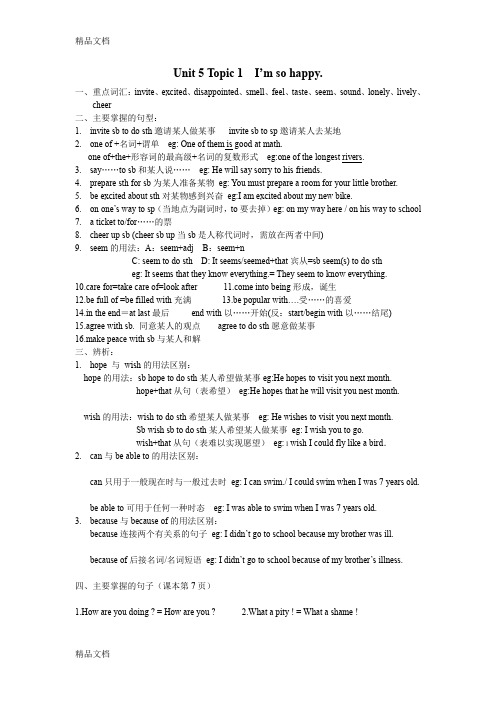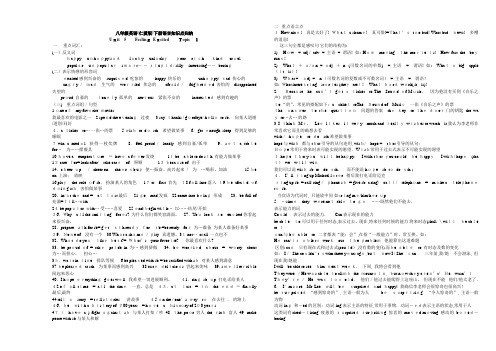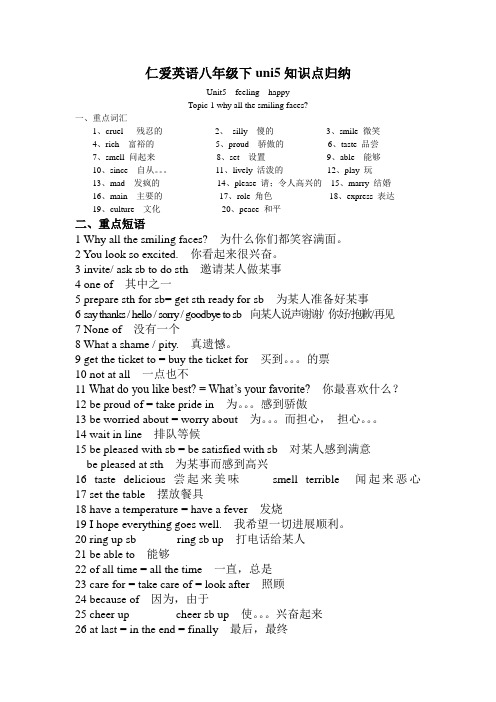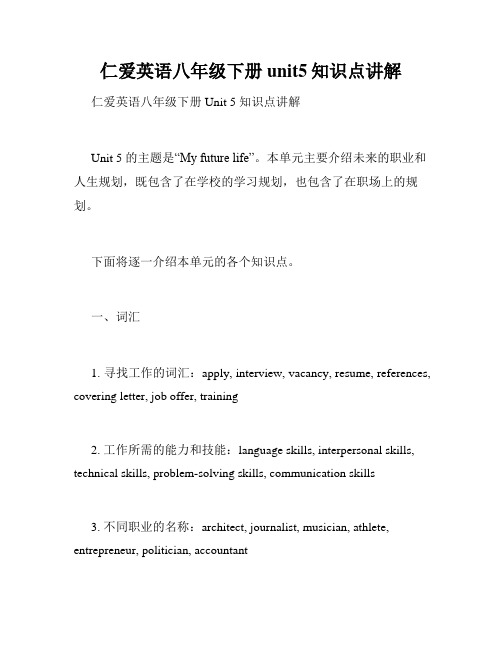仁爱版英语八年级下册Unit5知识点归纳复习
最新仁爱英语八年级下册Unit5-topic-1-I'm-so-happy知识点归纳

Unit 5 Topic 1 I’m so happy.一、重点词汇:invite、excited、disappointed、smell、feel、taste、seem、sound、lonely、lively、cheer二、主要掌握的句型:1.invite sb to do sth邀请某人做某事invite sb to sp邀请某人去某地2.one of +名词+谓单eg: One of them is good at math.one of+the+形容词的最高级+名词的复数形式eg:one of the longest rivers.3.say……to sb和某人说……eg: He will say sorry to his friends.4.prepare sth for sb为某人准备某物eg: You must prepare a room for your little brother.5.be excited about sth对某物感到兴奋eg:I am excited about my new bike.6.on one’s way to sp(当地点为副词时,to要去掉)eg: on my way here / on his way to school7. a ticket to/for……的票8.cheer up sb (cheer sb up当sb是人称代词时,需放在两者中间)9.seem的用法:A:seem+adj B:seem+nC: seem to do sth D: It seems/seemed+that宾从=sb seem(s) to do stheg: It seems that they know everything.= They seem to know everything.10.care for=take care of=look after e into being形成,诞生12.be full of =be filled with充满13.be popular with….受……的喜爱14.in the end=at last最后end with以……开始(反:start/begin with以……结尾)15.agree with sb. 同意某人的观点agree to do sth愿意做某事16.make peace with sb与某人和解三、辨析:1.hope 与wish的用法区别:hope的用法:sb hope to do sth某人希望做某事eg:He hopes to visit you next month.hope+that从句(表希望)eg:He hopes that he will visit you nest month.wish的用法:wish to do sth希望某人做某事eg: He wishes to visit you next month.Sb wish sb to do sth某人希望某人做某事eg: I wish you to go.wish+that从句(表难以实现愿望)eg: I wish I could fly like a bird.2.can与be able to的用法区别:can只用于一般现在时与一般过去时eg: I can swim./ I could swim when I was 7 years old.be able to可用于任何一种时态eg: I was able to swim when I was 7 years old.3.because与because of的用法区别:because连接两个有关系的句子eg: I didn’t go to school because my brother was ill.because of后接名词/名词短语eg: I didn’t go to school because of my brother’s illness.四、主要掌握的句子(课本第7页)1.How are you doing ? = How are you ?2.What a pity ! = What a shame !3.I don’t like it at all.(not ….at all一点也不)4.How do/does sth/sb +系动词eg: How do you feel? / How does the food taste?五、语法:系表结构(系动词+形容词)系动词:1.be动词(are/am/is/was/were)2.感官动词:feel(感觉起来)/look/seem(看起来)/sound(听起来)/smell(闻起来)/taste(尝起来)3.四变(turn+颜色)(get+长/短/暗/亮/暖和/冷/热)(become+好)(go+质/疯)。
仁爱版英语八年级下册Unit5知识点归纳复习

----八年级英语(仁爱版)下册语言知识点归纳 U nit 5 Feelin g E xcited Topic 1 一. 重点词汇: (一)反义词 ha ppy----u nh appy/s ad l uc ky----unl uck y poor----r ich kin d----cr uel popul ar----u npopu la r s mart ----stu pid/ silly interesting ----borin g (二)表示情感的形容词 excited 感到兴奋的 surpri sed 吃惊的 happy 快乐的 unh appy/ sad 伤心的 an gry / ma d 生气的 wo rried 焦急的 afr ai d/ frig hte ned 害怕的 disappointed 失望的 pr oud 自豪的 lon ely 孤单的 ner vous 紧张不安的 interes te d 感到有趣的 (三) 重点词组/句型 1.one o f my fav orite movies 我最喜欢的电影之一 2.spe nd the e venin g 过夜 3.say thanks / g oodbye/ h ell o to sb . 向某人道谢/道别/问好 4.a ticket to … 一张…的票 5.wis h to d o sth. 希望做某事 6.get enough sleep 得到足够的睡眠 7.win a med al 获得一枚奖牌 8.feel proud / lonely 感到自豪/孤单 9.s et a tab le for … 为……摆餐具 10.have a tempera ture = hav e a f ever 发烧 11.be a ble to do s th. 有能力做某事 12.care for= look after/ take car e of 照顾 13.beca use of 由于 14.c heer up / cheer on che er sb u p 使…振奋、高兴起来 / 为 …喝彩、加油 15.be on 上演; 放映 16.pla y the role of sb . 扮演某人的角色 17.at first 首先 18.f all into 落入 19.be afra id of doi ng st h. 害怕做某事 20.in/at th e end = a t last 最后 21.go mad 发疯 e into b ein g 形成 23.be full of 充满=fill …with 24.be pop ular with … 受……喜爱 25.end/begin wi th … 以……结尾/开始 26.Why a ll the smi ling fac es? 为什么你们都笑容满面。
仁爱英语八年级下unit5知识点归纳

仁爱英语八年级下uni5知识点归纳Unit5 feeling happyTopic 1 why all the smiling faces?一、重点词汇1、cruel 残忍的2、silly 傻的3、smile 微笑4、rich 富裕的5、proud 骄傲的6、taste 品尝7、smell 问起来8、set 设置9、able 能够10、since 自从。
11、lively 活泼的12、play 玩13、mad 发疯的14、please 请;令人高兴的15、marry 结婚16、main 主要的17、role 角色18、express 表达19、culture 文化20、peace 和平二、重点短语1 Why all the smiling faces? 为什么你们都笑容满面。
2 You look so excited. 你看起来很兴奋。
3 invite/ ask sb to do sth 邀请某人做某事4 one of 其中之一5 prepare sth for sb= get sth ready for sb 为某人准备好某事6 say thanks / hello / sorry / goodbye to sb 向某人说声谢谢/ 你好/抱歉/再见7 None of 没有一个8 What a shame / pity. 真遗憾。
9 get the ticket to = buy the ticket for 买到。
的票10 not at all 一点也不11 What do you like best? = What’s your favorite?你最喜欢什么?12 be proud of = take pride in 为。
感到骄傲13 be worried about = worry about 为。
而担心,担心。
14 wait in line 排队等候15 be pleased with sb = be satisfied with sb 对某人感到满意be pleased at sth 为某事而感到高兴16 taste delicious 尝起来美味smell terrible 闻起来恶心17 set the table 摆放餐具18 have a temperature = have a fever 发烧19 I hope everything goes well. 我希望一切进展顺利。
仁爱版英语八年级下册Unit5知识点总结

仁爱版英语八年级下册Unit5知识点总结Unit 5 Feeling ExcitedTopic 1 You look excited一.重点句型。
Section A1.How are you doing? =How are you? 多用于熟人之间的问候。
2.My father and mother want to invite your parents to go to the movies.1)A. want to do sth. = would like to do sth.B. want sth. = would like sth.2)invite sb. to do sth. invite sb. (to sp.) 邀请某人(到某地);Liming invited me to his party yesterday.3)go to the movies 去看电影;3. It’s one of my parents’favorite mo vies.1)one of + 形容词最高级+可数名词复数....中最....之一;Tom is one of the most lively boys in our class. 汤姆是我们班最活跃的男生之一。
2)“one of +可数名词复数”作主语时,谓语动词用单数形式。
One of the bags is mine.4.My mom will prepare some delicious food for us.prepare; prepare for; prepare…for; be prepared for; prepare to do sth. 的区别:A.prepare sth.意为“准备某事”强调准备的过程或动作。
Our English teacher was preparing the lessons when I came into the office.我进办公室时,我们的英语老师在备课。
仁爱英语八年级下册unit5单词加知识点

仁爱英语八年级下册unit5单词加知识点仁爱英语八年级下册Unit 5单词加知识点本单元的主题是“幸福生活”,让学生了解幸福生活的内涵,学习描述幸福生活的用语,并培养积极的生活态度。
一、单词表1. contribute v. 贡献,捐助2. charity n. 慈善组织3. needy adj. 贫困的,贫穷的4. orphan n. 孤儿5. homeless adj. 无家可归的6. arise v. 出现,产生7. conflict n. 冲突,矛盾8. engage in 参与,从事9. subject n. 主题10. bond n. 联结,纽带11. prosper v. 繁荣,昌盛12. stability n. 稳定13. harmony n. 和谐14. gratitude n. 感激之情15. fulfill v. 履行,实现16. pessimistic adj. 悲观的17. optimism n. 乐观主义18. positive adj. 积极的,正面的19. negative adj. 消极的,负面的20. perspective n. 规划,展望二、知识点1. 动词短语“engage in”“engage”是动词,表示“与……接触,从事,参与,约定”。
“in”是介词,表示“在……里面”。
所以,“engage in”可以译为“从事,参与”。
例句:I want to engage in charity work.2. 形容词“needy”“needy”是形容词,表示“贫困的,贫穷的”。
例句:I donated some money to help the needy children.3. 名词“harmony”“harmony”是名词,表示“和谐”。
例句:“Harmony” is important for a happy family.4. 动词短语“arise from”“arise”是动词,表示“出现,产生”,后面跟介词“from”表示“来源于”。
仁爱版英语八年级下册Unit5-topic2-知识点归纳

Unit5 Topic 2 SectionA1.看起来焦急look worried2.Anything wrong? 形容词或副词修饰不定代词放后面。
3.happy-unhappy fair-unfair popular-unpopularhealthy-unhealthy friendly-unfriendlylucky-unlucky4.be sorry to do sth./be sorry about sth. 对…感到抱歉5.seem to do sth. /seem+形容词/It seems that+句子好像…6.do well in…=be good at…擅长do badly in …在…做得差7.be strict with sb. 对…要求严格8.feel lonely 感到孤独9.have no friends to talk with 没有朋友可以交流10.Thank you for+doing sth. 谢谢你做某事11.have a talk with sb. 与…交谈12.worry(动词)about=be worried(形容词)about13.need(动词) +to do sth. 需要做某事needn’t(情态动词)+do sth./don’t need (动词)+to do sth.不需要做某事14.work harder and do better 工作更加努力并且做得更好15.Take it easy!别紧张=Don’t be nervous!16.try to do sth. 试着/尽力去做某事17.be glad/happy/pleased to do sth.开心做某事have fun doing sth.开心做某事18.Good luck! 祝你好运!Best wishes!给你最好的祝福。
luck 名词lucky 形容词luckily 副词unlucky 形容词unluckily 副词SectionB1.fail to do sth. 做某事失败fail the exam 考试失败2.That’s too bad. 那太糟糕了!3.Why don’t you do sth.=Why not do sth. 为什么不做某事4.how to do sth.怎样做某事what to do 如何去做5. talk with others 与他人交谈others=other peopleanother 再来一个/一些(泛指)the other 两者中的另一个(特指)6.Don’t worry!别担心!be worried about…担心7.有这些感觉get/have the/these feelings8.在你这样的年纪at your age9.make friends with sb. 与某人交朋友10.tell sb. a joke/jokes 给某人讲笑话11.让某人发笑make sb. laugh make sb. do sth.让某人做某事12.would like to do sth.=want to do sth. 想做某事13. It’ll be OK. 一切都会好起来的。
仁爱英语八年级下册unit5知识点讲解

仁爱英语八年级下册unit5知识点讲解仁爱英语八年级下册 Unit 5 知识点讲解Unit 5 的主题是“My future life”。
本单元主要介绍未来的职业和人生规划,既包含了在学校的学习规划,也包含了在职场上的规划。
下面将逐一介绍本单元的各个知识点。
一、词汇1. 寻找工作的词汇:apply, interview, vacancy, resume, references, covering letter, job offer, training2. 工作所需的能力和技能:language skills, interpersonal skills, technical skills, problem-solving skills, communication skills3. 不同职业的名称:architect, journalist, musician, athlete, entrepreneur, politician, accountant二、语法1. 将来时的用法:用于表示将来某个时间或事件发生,由will 或be going to构成2. 陈述句的一般将来时:主语 + will + 动词原形3. 陈述句的be going to将来时:主语 + be(am / is / are) + going to + 动词原形4. 一般将来时的用法:表示意愿、意图、承诺、推断等意思5. be going to将来时的用法:表示计划、打算、预测等意思三、听力本单元的听力重点在于聆听访谈和问题回答。
1. 聆听访谈:在聆听访谈时,要注意听讲者介绍自己的职业、工作的内容和所需技能等信息,同时需要注意聆听讲者对未来的规划和计划。
2. 问题回答:在问题回答时,要注意理解问题的内容并准确回答问题,同时需要注意表达清晰、有条理。
四、口语本单元的口语训练主要围绕职场交流展开,需要掌握各种职场用语和表达技巧。
1. 自我介绍:需要准备一份简短的自我介绍,介绍自己的姓名、职业、技能和未来规划等信息。
[原创归纳]仁爱版八年级下英语语法归纳
![[原创归纳]仁爱版八年级下英语语法归纳](https://img.taocdn.com/s3/m/8d95b6f58ad63186bceb19e8b8f67c1cfad6eed0.png)
初二年下册英语语法归纳(仁爱版)【2】Unit5Topic1SectionA2.1nvitesb./todosth.邀请或人做某事;Invitesb.\+地点邀请或人去某地.3.Prepare...for...=getreadyfor...为预备.4.Saythankstosb.向或人道谢. SectionBl.Aticketto\for的票.2.Beabletodosth...=can有才能做某事.但是can一般用于如今时和曩昔时而beableto可以用于任何时态・3................................................................................ Ringsb.up打德律风给或人.4.Beproudof以自满.5.Bepleasedwith.对..满足.SectionC1.Careabout关怀;Care+从句省略about2.Getmarriedtosb.=marrysb.与或人娶亲.3.关于消费:Sth.Costsb.+钱;Sb.spend+时\钱in.onsth.'doingsth.Ittakesb\时todosth.;Sb.pay钱forsth.4.Beon上映.5.Cheerup使振作.6.What...for=why.(白话)SectionDeintobeing形成.2.Befullof=befilledwith充满.3.......................... Endwith以结尾.4.Makepeacewithsb.与或人媾和.Unit5Topic2SectionA1.Seem/todosth.似乎做某事.\adj作表语.;Itseemthat+从句.2.Havetalkwithsb.与或人攀谈.3.Bestrictwithsb.对或人严厉.SectionBl.Failtodosth.掉败,做不到某事.2.Atone'sage.在年纪时3.Attheageof.在岁时4.Makesb.todosth让或人做某事.As+adj\adv原级+as与一样;Notas\so+adj\adv原级+as与不一样.6.Be\getusedtodoingsth.习惯做某事;Usedtodosth.曩昔习惯做某事.SectionC 1.Beafraidofdoingsth.畏惧做某事.2.Dealwith=dowith.处理.4.Refusetodosth.谢绝做某事.5.Eventhough=even讦即使.6.Not...anylonger=nolonger不再.7.Fallasleep入睡.8.Inone'steens在或人的时期.9.Give.ahand=dosb.afavor=helpsb.给或人关心.10.比较级+and+比较级越来越程度递增.The+比较级...The+比较级…越越两种情形同时变.11.原因状语从句.Unit5Topic3SectionA1.Have\has+动词曩昔分词.如今完成时.2.Can'tbe确定不是,否认推想.3.Mustbe必定是,确定推想.4.Maybe可能是,猜测推想.5.Attheendof...在…的最后;Intheendof...最后.6・That\it's+adj+foi\tobdosth.7.1nsteadof+n.\v\代…代替8.Taketurnstodosth.=taketurnsatdoingsth.=dobyturns轮流做某事.SectionB 1......................................... B ebad\good for...对有害\益.2661alongwithsb\sth与相处得好.3.Justas似乎.4.Smileat\tosb.\sth.微笑面临或人.某事;Smile,微笑(没有声音);Laugh,大笑(有声音),Laughatsb.取笑或人.5.Giveasurprisetosb=givesbasurprise给或人一个惊喜.6.0ntheone'swayto...在或人去的路上;后接副词则省去to.SectionC1.世界上举世无双的事物前加定冠词the2.Hadbetterdosth\notdosth.最好做某事.不要做某事.SectionD1.Getbacktosth持续回到某事上.Unit6topic1l.Goonavisitto...去旅游.参不雅.2.1t'shatetosay这很难说.3.Decidetodosth决议做某事.4.Make(take)adecide下决议.5.Decideon\upon决议.SectionBl.Ticketat+钱+for...票的价钱.2・具体某一天的早・中・晚上,前用介词on・SectionCeupwith…想出.2.Lookforwardtosth\doingsth.愿望某事.愿望做某事.3.Hearfromsb收到或人来信.SectionD动词不定式1•根本情势:to+动词本相(确定情势)Notto+动词本相(否认情势)2・特点:没有人称和数的变化・3・常用句型:It's+adj+todosth.Too+adj+todosth・4・动词不定式可以跟疑问词连用・E.g:Idon'tknowwhattodo\howtodoit.Unit6topic2SectionA1.Plantodosth.筹划做某事.2.Makeaplanto...\makeplansto...制订的筹戈U.SectionB1.Atthefoot of...在的脚下.2.Marksthebeginningof标志着的开端.3.Bytheway.趁便问一下.4.Onbothsides of...在的两旁.5.“几个半”表示办法:基数词+and+ahalf+n.=基数词+n.+and+ahalf.E.g.oneandahalfyears=oneyearandahalf.一年半.6.表示方位的介词差别Inthe+方位名词+of・・・指某一规模内的地区.(中国,北京)tothe+方位名词+of・・・指互不交界互不管辖的地区.(中国,日本)onthe+方位名词+of・互相交界但互不管辖的地区.(中国,尼泊尔)SectionCl.Outofsight看不见(视线之外)2.Noticesbdo\doingsth.留意或人(正在做)做某事.3.Can'thelpdoing不由得.4.Arrivein+大地点;Arriveon+小地点SectionD1.Havefundoingsth.从做某事中得到乐趣.2.时光状语从句特点:常用一般如今时表示未来时;主句未来时,从句用一般如今时;时态一致——主句与从句同时为曩昔时.引诱时光状语从属连词:When(当的时刻,强调统一时光或一前一后)while(当的时刻,带有延续性)before(在之前)after(在之后)as(当的时刻)until.till(直至U为止)assoonas (一就)Unit6topic3SectionAl.Beafraidofdoingsth.\that+从句.畏惧做某事.SectionB1.Warnsbtodosth\nottodosth.警告.提示或人做某事.不做某事.2.Warnsbaboutsth提示或人某事.SectionC1.Goondoingsth持续做某事(统一件);Goontodosth.持续做某事(另一件)2.Make\letsbdosth使或人做某事.3.使役动词makelethave等,一律省去to,直接加动词本相.SectionD前提状语从句:1•由if,uness(除非)引诱的状语从句叫前提状语从句.2.特点:常用一般如今时表示未来时;主句未来时,从句用一般如今时.主句含一般未来时.祈使句•情态动词,从句用一般如今时.Unit7topic1SectionA1.Turnto=asksb.forhelp向或人乞助.2.Knowabout懂得.3.Chatwithsb.ontheinternet和或人在网上谈天.4.Tryone'sbest\doone'sbest尽或人最大尽力.5./Thinkover细心斟酌\Thinkof斟酌,对有意见.此时可与thinkabout交换.6.Imaginedoingsth.想象做某事.SectionB1.Haveasweettooth爱吃甜食.2.What'smore并且.SectionCl.Inorderto do...为了做;Inorderthat+从句引诱目标状语从句.2.Keepupsth.保持做……3.Seed+间接宾语(sb.)+直接宾语(sth.)双宾构造句.4.Givesb.bes twishesto.或人最好的祝贺给...What引诱的感慨句,强调名词,单数可数名词前带冠词a\an・有时主语和谓语可以省去.SectionDetrue系表构造.成为实际.2.Invitation邀请函.3•宾语从句IUnit7topic2SectionA1.Beglad+adj.+that从句.愉快……2.Cutsth.切某物;Cutup切碎;Cutsth.Into...切成;Cutdown砍到.3.Addto添加;Add...to…将加在…;Addup加起来;Addupto总计为4.表次序词:(含序数词)First起首.Second其次next在此then然后.Afterthat然后finally最后. SectionBl.Spreadsthonsth.往上面抹2.Practicemakesperfect熟能生巧. SectionCl.Startwith以……开端.2.Eatsth.up吃完,吃光.3.Finishdoingsth.完成做某事.4.Pickup捡起,捡起.SectionD1.Atthesametime同时.2•宾语从句IIf\whether引诱的宾语从句,不能省略引诱词可以与whether通用,但在whether ・・・or not的情形下则不能.Unit7topic3SectionAl.Forsale待售;0nsale出售.2.Besatisfiedwith...对满足.3.Wishsb.sth.祝贺或人;Wishtodosth=Hopetodosth.愿望做某事.Wishsb.todosth.愿望或人做某事.4.Hope斟酌可能性的“愿望”;Wish不斟酌是否可能.SectionBl.Ordersbtodosth敕令或人做或人;Orderthat+从句.SectionCl.Beworthdoingsth.值得做某事.SectionD1.1t'ssaid...据说后接that引诱从句.2.1nshort总之.3.Notonly.butalso.不但..并且..衔接的并列成分必须雷同,当衔接两个名词或代词为主语.谓语动词单复数采用就近原则,保持一致.4.Notall并非,部分否认.5.It'sbelievedthat...信任6•副词比较级根本用法:副词的比较等级情势与变化与形容词大致雷同,今后缀-ly结尾的比较级和最高等大多在前面加more和most(1)原级・As+adj./adv.原级+as和一样.⑵比较级.Adj./adv.比较级+than比…更…⑶最高等•三者或三者以上比较时,常用the+adj./adv.最高等+in/of・・・(比较规模).副词最高等前可以省略the否认比较级可用less+adj./adv.原级+than.同级比较中第一个as前面用序数词或量词润饰,可表示倍数关系.形容词和副词比较级前用much\alot等润饰,表示不同程度.借助other.else或否认词,比较级情势可用来表示最高等概念.(4)the+比较级,the+比较级表示越越⑸比较级+and+比较级.表示越来越……Unit8Topic1SectionA1.目标状语从句.(同成果状语从句)So・・・that・・・引诱的状语从句.So+adj./adv.+that・...so+adj.+an/a+名词单数+that・・・如斯以至于用于引诱主句导致的成果.Such+n.+that•从句•同样表示如斯以至于.不同:so后面接形容词或副词,such后面接名词.SectionBl.Bemakeof+原料由制成.(看得出原材料)2.Bemakefrom+原料由制成.(看不出原材料)3.Afford(tobuy)sth.买得起.累赘得起SectionCl.Dependon依附.取决于.2.Dependonsb.todosth.dependonsb./sth.3.Thesame as...与一样.4.Nearly差不多.Near邻近.5.Hard尽力地.Hardly几乎不.SectionD1.Protect....from...破坏…不受…的损害.2.Youarewhatyouwear衣如其人. Unit8Topic2SectionA1.Allowsb.todosth.许可或人做某事;Allowdoingsth许可做某事.2.Suitableforsb.todosth.对或人来说合适做某事.3.Stopsb.fromdoingsth.阻拦或人做某事.4.Tocarryouttheplan把筹划付诸行动.5.Atwork在工作,从事于SectionBSectionC...SectionD1.Advise建议.作动词;Advice建议.作名词.2.Artofdressing着装艺术. Unit8Topic3SectionA1.Thereisgoingtobe=therewillbe(初一常识)未来时构造.SectionB1.Askforsb./sth至于,就或人.某事而言.2.Another作形容词,意为又一个,再一个.其构造为:/another+n.单数可数=onemore+n.单数可数.\another+数词+n.复数可数=数词+more+n.复数可数.SectionCl.Getitsname得名.2.Design…as…把设计成3.Either...or...要么要么,不是就是,表选择关系.4.区分that,those,one,ones.That指代上文消失过的不可数名词.Those指代上文消失过的复数名词.One指代上文消失过的可数名词的单数.Ones指代上文消失过的可数名词的复数.SectionDl.Well-known=widelyknown众所周知.2.Atthetime一度,曾经.3.Atatime每一次.用在句末.4.Attimes有时刻.等于sometimes5.Except除了以外.除去部分不包括在内;Besides除了以外,还有除去部分包括在内;But除了......以外,没有......,只有......6•宾语从句皿删除:假如句中含有助动词do\does\did就把其删掉落后面的动词,作出响应的变化.移动:假如句子含有情态动词和be动词,以及否认的助动词,把它们移动到主语后,行动动词前.宾语从句的口诀:进修宾从要留意,时态语序和连词.时态主从要呼应:主句若为如今时,从句时态随句意.主句若为曩昔时,从句时态变曩昔.宾从所示表真谛,时态不变不疑惑.语序要用陈述序,切莫照搬疑问句.That衔接陈述句,省与不省要留意•从句若表“是否”时fwhether要切记.特别问句做宾语,仍用本来疑问词.三个问题要记牢,切莫丢东又往西.。
- 1、下载文档前请自行甄别文档内容的完整性,平台不提供额外的编辑、内容补充、找答案等附加服务。
- 2、"仅部分预览"的文档,不可在线预览部分如存在完整性等问题,可反馈申请退款(可完整预览的文档不适用该条件!)。
- 3、如文档侵犯您的权益,请联系客服反馈,我们会尽快为您处理(人工客服工作时间:9:00-18:30)。
八年级英语(仁爱版)下册语言知识点归纳Unit 5 Feeling Excited Topic 1一. 重点词汇:(一)反义词happy----unhappy/sad lucky----unlucky poor----rich kind----cruelpopular----unpopular smart----stupid/ silly interesting----boring(二)表示情感的形容词excited感到兴奋的surprised 吃惊的 happy 快乐的 unhappy/ sad 伤心的angry / mad 生气的worried 焦急的 afraid/ frightened 害怕的 disappointed 失望的proud 自豪的 lonely 孤单的nervous 紧张不安的 interested 感到有趣的(三)重点词组/句型1.one of my favorite movies我最喜欢的电影之一 2.spend the evening 过夜 3.say thanks / goodbye/ hello to sb. 向某人道谢/道别/问好4.a ticket to…一张…的票 5.wish to do sth. 希望做某事 6.get enough sleep 得到足够的睡眠7.win a medal 获得一枚奖牌8.feel proud/ lonely 感到自豪/孤单9.set a table for…为……摆餐具10.have a temperature = have a fever 发烧 11.be able to do sth. 有能力做某事12.care for= look after/ take care of 照顾13.because of 由于14.cheer up / cheer on cheer sb up 使…振奋、高兴起来 / 为…喝彩、加油 15.be on 上演; 放映16.play the role of sb. 扮演某人的角色17.at first 首先 18.fall into 落入 19.be afraid of doing sth. 害怕做某事20.in/at the end = at last 最后21.go mad 发疯e into being 形成 23.be full of充满=fill…with24.be popular with…受……喜爱25.end/begin with…以……结尾/开始26.Why all the smiling faces? 为什么你们都笑容满面。
27.You look so excited.你看起来很兴奋。
28.prepare sth for sb= get sth ready for sb =be ready for 为…准备为某人准备好某事29.None of 没有一个 30.What a shame / pity. 真遗憾。
31.not… at all 一点也不32.What do you like best?= What’s your favorite? 你最喜欢什么?33.be proud of = take pride in 为….感到骄傲 34.be worried about = worry about 为….而担心,担心….35.wait in line 排队等候 6.be pleased with sb = be satisfied with sb 对某人感到满意37.be pleased at sth 为某事而感到高兴38.taste delicious 尝起来美味 39.smell terrible 闻起来恶心40.I hope everything goes well. 我希望一切进展顺利。
41.ring sb up 打电话给某人42.of all time = all the time 一直,总是 43.at last = in the end = finally 最后,最终44.tell a story = tell stories 讲故事 45.on the / one’s way to 在去往....的路上46.be with a history of 200 years = have a history of 200 years47.( have a ) fight against sb 与某人打架/吵 48. the poor 穷人 the rich 富人49. make peace with sb与某人和解二. 重点语言点1. How nice! 真是太好了! What a shame! 真可惜!=That’s too bad! What bad news! 多糟的消息!这三句全都是感叹句.它们的结构为:1) How + adj./ adv. + 主语+ 谓语! 如: How moving the movie is! How fast the boy runs!2) What + a/an + adj. + n. (可数名词的单数) + 主语 + 谓语! 如: What a big apple (it is)!3) What + adj. + n.(可数名词的复数或不可数名词) + 主语 + 谓语!如: What interesting stories (they are)! What hard work( it is)!2. Because he can’t get a ticket to The Sound of Music. 因为他没有买到《音乐之声》的票.to “的”,常见的搭配如下:a ticket toThe Sound of Music 一张《音乐之声》的票the answer to the question 问题的答案 the key to the door 门的钥匙 the way to…去….的路3. I think Mr. Lee likes it very much and really wishes to watch it.我认为李老师非常喜欢它而且的确想去看.wish/ hope to do sth.希望做某事hope与wish 都与that引导的从句连用, wish/ hope + that 引导的从句;Hope常用于将来时表可能实现的愿望.Wish常用于过去式表示不可能实现的愿望.I hope that you will be happy. I wish that you could be happy. I wish/ hope (that) we will win.我们可以说wish sb. to do sth. 而不能说hope sb. to dosth.;4. I’ll ring up Michael later. 稍后我打电话给迈克.ring up sb. = call/ ring/ phone sb. = give sb. a ring/ call/ telephone = make a telephone to sb.当宾语为代词时, 只能放中间.如: ring me/him/her up 5. …since they were not able to go. ……既然他们不能去.表示能力的词.Could 表示过去的能力. Can表示现在的能力be able to可以用于任何时态,表示过去,现在,将来任何时候的能力.将来时态(shall \will be able to--)can与be able to 二者都表“能;会”,在指“一般能力”时,常互换。
如:He can/is able to work out the problem. 他能算出这道难题.区别: can 只有现在式和过去式(could),没有数的变化;而be able to 有时态及数的变化如: I/ She couldn’t swim three years ago, but now I / She can . 三年前,我/她不会游泳, 但现在我/她能.I will be able to see him next week. 下周, 我将会看到他. They were /He was able to climb the mountain, but now they aren’t/ He wasn’t.They’re / He was too old. 他们/他过去能爬得上这座山, 但现在不能. 他们/他太老了.6. I’m sure Mr. Lee will be surprised and happy! 我确信李老师会很惊奇也很高兴!be surprised “感到惊奇的”, 主语一般为人. be surprising “令人惊奇的”, 主语一般为物.动词-ing 和-ed的区别:动词-ing表示主语的特征,常用于事物.动词-ed表示主语的状态,常用于人.这类词有:tired-tiring 疲惫的 surprised-surprising 惊喜的 moved-moving感动的 bored-boring无聊的excited-exciting兴奋的 interested-interesting 有趣的 relaxed-relaxing休闲的等等.For example:The game is interesting. I am interested in the game.7. because of “由于”,是介词短语,后常跟名词或短语。
Because 和so 不能同时使用。
如:He didn’t come to school because of his illness./ because he was ill. 由于他的病,他没来上学。
We didn’t go there because of the heavy rain./ because it rained heavily. 由于大雨,我们没去那儿。
because 引导的原因状语从句: because 用来回答why提问的问句,表示的原因语气很强,一般用在主句后面,强调因果关系.Mr. Wang looks tired because he worked late last nightand didn’t get enough sleep.Kangkang is disappointed because his best friend is not able to come.--Why do they feel proud? ----Because a player from their country won a medal.8. Maria was able to cheer up the family by teaching them to sing lively songs…玛丽亚有能力通过教他们唱轻快的歌曲使整个家庭振作起来。
